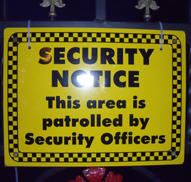Four in ten security guards in the UK are suffering Post Traumatic Stress Disorder (PTSD), from verbal and physical abuse, according to researchers at the University of Portsmouth.
They describe their work as the largest study to date of mental health among British private security staff. They interviewed 750 workers and found that almost 40 per cent of them were showing symptoms of PTSD; yet provision by security companies for employee mental health and wellbeing services is lacking, they add.
The research has been led by Dr Risto Talas and Prof Mark Button, criminologist in the Institute of Criminal Justice Studies (ICJS) at Portsmouth. Prof Button said: “With almost 40 per cent of those surveyed exhibiting symptoms of PTSD, it leaves a very clear message that the issue of mental health is not currently being taken seriously by security managers. There is an emerging picture of a failure by the security industry to address these issues.”
The UK has about 350,000 SIA-licensed security guards, and others working in-house that don’t need a license. They patrol high streets, shopping centres and bus and train stations; cover night-time and entertainment venues; guard government buildings, courts, social security offices, airports and ports; they transport cash and valuables, and prisoners to and from court and jails.
Contact with the public is a part of most of the roles. Researchers found this often produces conflict, which could be anything from verbal abuse to violence. In extreme cases, security operatives have been killed on duty. The research showed:
– 64.6 per cent of security guards suffered verbal abuse at least once a month (and half of these were as regular as once a week).
– 43 per cent of respondents reported threats of violence at least once a month (and 10 per cent were getting threatened on a daily basis)
– More than 30 per cent of those surveyed reported some kind of physical assault in the workplace once a year. Almost 10 per cent reported a minor physical assault at least once a month).
Mark Button said: “The research has revealed a worrying lack of support provided by the security companies. This must change and more research is required on what the security industry as a whole must do to address this issue before it becomes a larger societal issue, with added pressure on the limited mental health and wellbeing services provided by the NHS.”
Comment
At the charity PTSD Resolution, Campaign Director Patrick Rea says: “This is a tough time for security personnel and other key workers during the pandemic. They are having to deal with unfamiliar, challenging situations such as managing queues of people at retail outlets, with worries for their own safety from infection. Too often line managers just don’t have the skills to identify staff who may be struggling mentally – and why should they. It requires training to know what to look out for and what to do to help a traumatised person.”
PTSD Resolution has launched an online interactive version of its TATE (Trauma Awareness Training for Employers) short course. It’s designed for security line managers, counter-terror operatives, resilience planners and HR and employee development and training teams. TATE is designed to enable staff to:
Recognise post-traumatic symptoms amongst security guards and other staff
Understand the most common observable effects of trauma on behaviour
Know how to engage with traumatised staff, and when to signpost them to further support
Formulate, through discussion, clear routes to resolve specific workplace difficulties caused by trauma
Treatment options can include therapy delivered online by TATE organisers PTSD Resolution, which operates a network of 200 therapists. The charity delivers free therapy to all veterans of the armed forces, reservists and their families, as well as members of ASIS and family members. The course trainer is a PTSD Resolution therapist, Rosalind Townsend, author of the book ‘PTSD Understanding and Recovery’.
See also Health and Safety Executive (HSE) advice on lone working.










